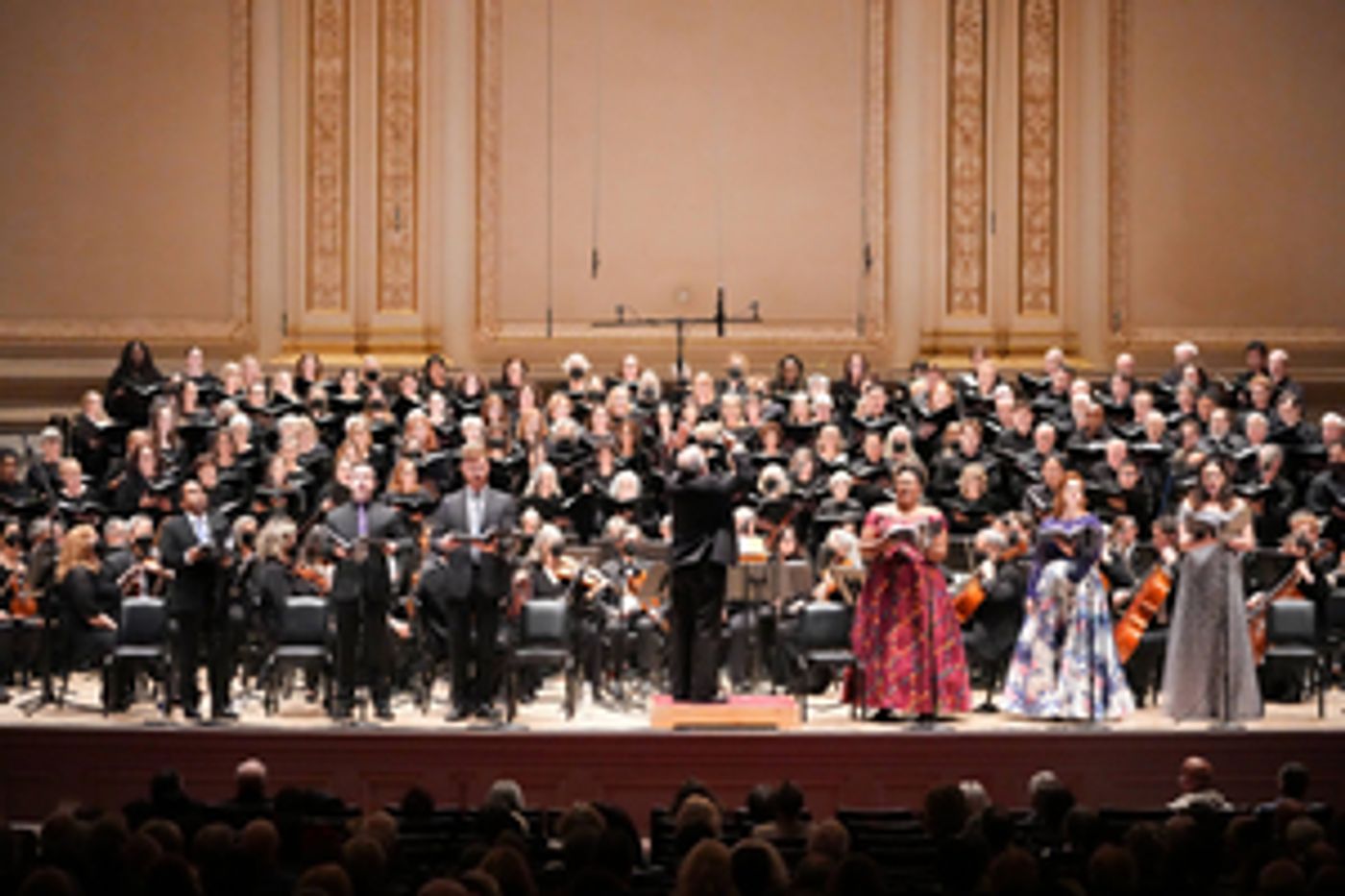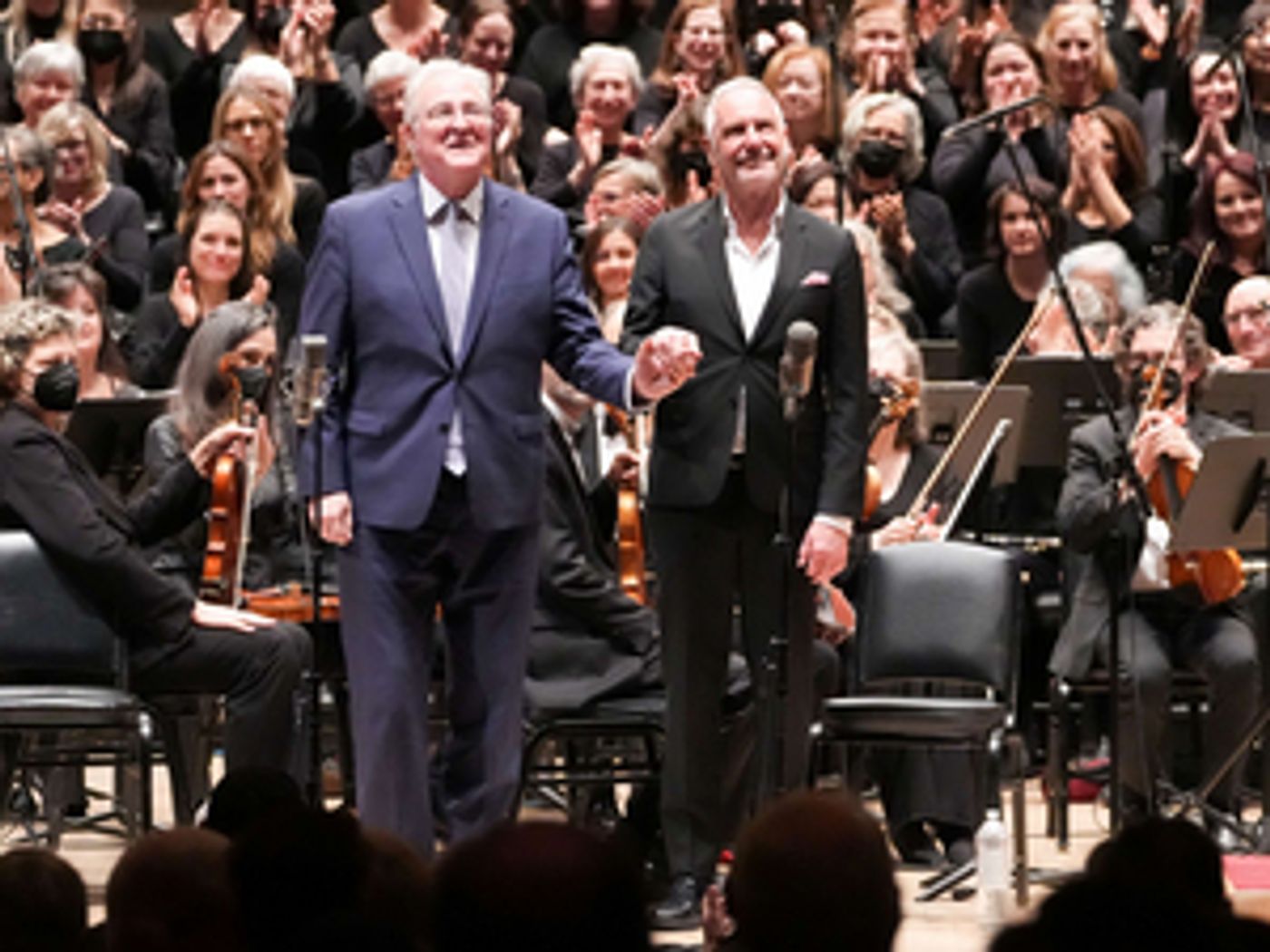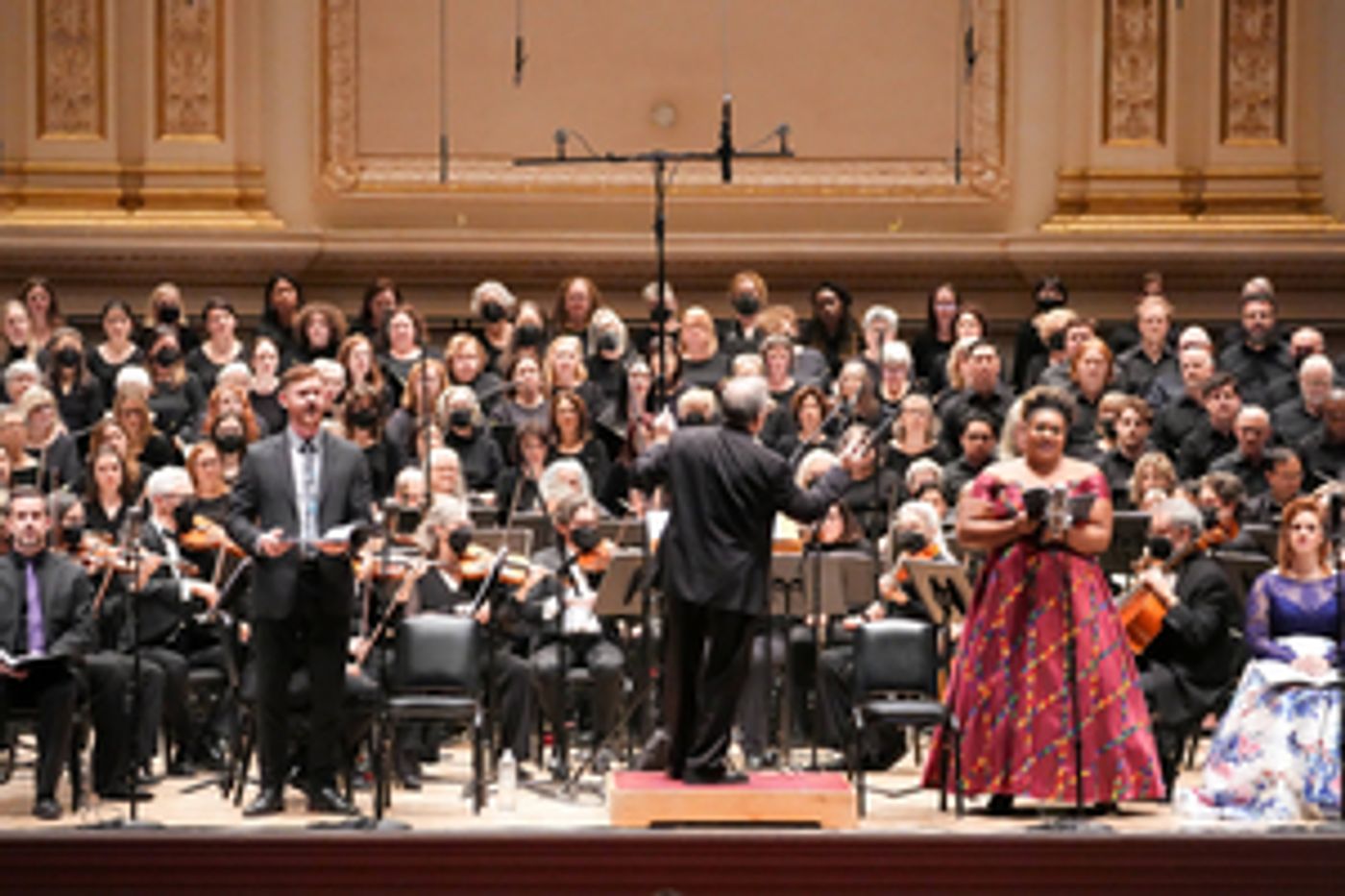Review: Oratorio Society Debuts Stunning NATION OF OTHERS by Moravec and Campbell at Carnegie Hall
Soloists led by Susanna Phillips, Maeve Hoglund, Raehann Bryce-Davis, Steven Eddy, Joseph Beutel added vocal glamour to striking performance under Kent Tritle

Photo: Brian Hatton
The Oratorio Society of New York (OSNY), under Kent Tritle, gave its second stirring world premiere by Paul Moravec and Mark Campbell with Tuesday's outstanding performance of A NATION OF OTHERS.
On the surface, the two pieces commissioned by the OSNY from Moravec and Campbell seemed to have little in common, except for the musical acuity of the composer, who always knows when to change keys and mood, and librettist, who knows how to tell a story better than just about anyone.
While the first, SANCTUARY ROAD, had an intimacy to it, with the individual tales based on the trials of travelers and conductors on the Underground Railroad (based on William Still's writings) during the US Civil War, A NATION OF OTHERS' stories became part of a larger, patchwork quilt.

Photo: Brian Hatton
Sometimes it was almost a Tower of Babel, with immigrants from many countries joining together with thoughts of the unknown that lay ahead of them, their voices layered one upon another, letting us feel that we're part of that single day in 1921. While individual voices came through, this was more a tale of shared experiences, from their questions as they traveled about "this strange new land" to a theme that ran through the piece: "possibilities."
Moravec's score had an urgency, a yearning about it that reflected the immigrants' need for a new life, for a variety of reasons: persecution, poverty, the inability to escape disease. The music could be beautiful when it was called for, but being harsh and dissonant at other times.

conductor Kent Tritle. Photo: Brian Hatton
The opera begins with a single voice--singing acapella (a pretty gutsy move for the composer, I thought)--a Sicilian, Tomasso, standing on deck as the ship enters New York harbor. Yes, he is wondering aloud about what lies ahead for him in this new home, but he is also thinking about what he has left behind: his wife and daughters. Soon, he will be joined in song by those traveling alongside him, all in the same boat (as it were), hovering between excitement and fear as they approach Ellis Island. "We are near..." they sing, "...Sobbing, singing, dancing...."
The fact is, as the libretto assures us, the group of voyagers may have physically left their countries behind, but it is nonetheless with them. As Moravec told me, quoting novelist William Faulkner, 'The past is never dead; it isn't even past.' And that's the story of the people in NATION: They're carrying the past with them." He added, "Ours is not just a nation of 'other people,' that look different or act differently, but a nation of 'other nations.'"
They hover between the lands that they've physically left behind, but know intrinsically that they will always be with them. For Tomasso, he sings aloud to his wife as if she were with him, rather than physically far, far away--because for him she is there, in his heart and head. He wonders how she will feel as she follows later, "Will you breathe in the air of fresh hope?" he asks, wanting the best, but clearly not sure whether they will get it.
Sometimes Moravec's musical lines are pure and simple, while other times they become cacophonous, as if the travelers are hearing the unknown languages surrounding them and can't make out a word (as was quite frequently the case). Yet they know that everyone has the same thoughts and worries, wanting to be seen and heard for who they are, as Campbell's libretto gets into their heads:
"Move along. Don't cough. Don't yawn. Don't blink. Don't limp...." "Look strong. Look bright. Look clean. Look healthy and well. Smiles sweetly...." "Do not utter a word. Look straight ahead. Do not look in their eyes. Don't let them see fear..." "Keep on moving and show how strong you are, how healthy you are, how ambitious you are...." "Will we get there? Will we get past this line" Will we see this new land that we've seen in our dreams?..."
The culmination of all their anxieties seems to come together in a scene near the end, in the island's hospital, between Aram, who has escaped genocide in Turkey only to be taken down (SPOILER!) by tuberculosis before he has ever seen America, and Constanza, his nurse, who left Spain 20 years before with her parents and has made what seems a good life here.
Moravec's music for Aram is particularly beautiful and Campbell proves, as ever, that less is more, giving the music room to blossom as he tells his story, while Constanza and the other nurses sound like the angels caring for him as he dies, wishing "May your next journey be a better one, a kinder one, a sweeter one...."
The ending reminds us of the roles that immigrants like these play in our lives (something many people in the current political climate clearly have), whether as those who take care of our children and homes or staff our restaurants or build our towers or fill professional roles in education or financial business.
It was a fine evening, a glowing event, telling of the kind of day that many could never forget because of its colossal effect on their lives--or didn't want to remember because it was perhaps the scariest thing that ever happened to them. As Tomasso sang, bringing his arrival full circle, reiterating key themes from the piece, "But in the new land, there are such possibilities. We will be happy here, here...in this strange new land."
The soloists were exemplary, switching roles on a dime, including sweet, questioning tenor Martin Bakari (Tomasso was part of his performance); the firm and vigorous baritone Steven Eddy; the skilled and winning bass-baritone Joseph Beutel. But it was the women who stood out most to me, whether it was their music or simply the qualities of their voices I can't really say.
I've heard soprano Susanna Phillips many times over the years, at the Met and elsewhere, but never heard her sound better, her voice more sweet. I've never come across soprano Maeve Hoglund before, but her soaring voice was a revelation, filled with drama and force. And the velvet and strength of mezzo Raehann Bryce-Davis, coupled with her humor, reminded me of her Baba the Turk in RAKE'S PROGRESS earlier this season at the Met, and the wondrous path ahead of her--like the dreams of so many in the oratorio.
Bravo to conductor Kent Tritle, the Oratorio Society's Music Director, for bringing all the singers, both soloists and chorus, together with the full orchestra, making them sound as one in the huge work. The work
WHITMAN'S AMERICA
The evening began with another, shorter piece, a panoramic setting of six poems from Walt Whitman's final version of "LEAVES OF GRASS" that composer Robert Paterson describes as a "quasi-fantasia." This performance was its New York premiere.
There was no questioning the Americana nature of the score, with echoes reminiscent of the symphonic music of Aaron Copland and Leonard Bernstein. While the breadth of the cycle was grand, each of the songs nonetheless seemed intimate. It is, perhaps, "from an imagined Whitman as he lay on his deathbed," according to Paterson. (Indeed, this version of the poems is often called "The Deathbed Edition.")
After a short orchestral interlude, the chorus sprang to life, with "Gliding o'er all." The orchestra surrounded them with the sound of the sea. I loved Paterson's tender approach to the piece, combining its clearly melodic tone with percussive elements and a skilled addition of brass.
While the orchestra was an essential part of the score--particularly the variety of percussion and brass--and did an outstanding job, the chorus had the greatest opportunity to shine. Both in its solo work and accompanying soprano Susanna Phillips and baritone Steven Eddy, they often echoed the composer's fondness for percussion. I was particularly taken with the choral work in "I Hear America Singing."
To me, however, soprano Phillips was the perfect muse for the music, with her glowing voice and demeanor for her solo song, "Prairie Sunset." Eddy's lovely baritone excelled in the introspective "I Dream'd in a Dream."
It was a fitting companion to A NATION OF OTHERS--though a far cry from the America we frequently hear about today--and the dream that immigrants had of what could possibly change their life for the better.
Reader Reviews
Videos

